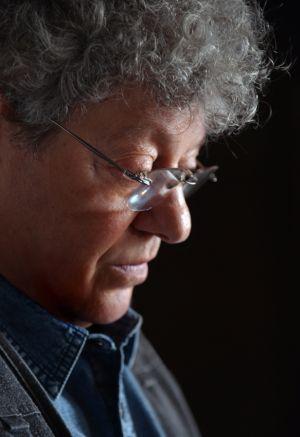Kántor Péter: Biography
Péter Kántor (Budapest, 5 November 1949 – Budapest, 21 July 2021)
Attila József Prize winning Hungarian poet and literary translator, member of the Digital Literature Academy since 2015.
*
Born on 5 November 1949 in Budapest. Graduated from the Radnóti Miklós Gymnasium in 1968, received a degree in English and Russian Studies from the Faculty of Humanities of Eötvös Loránd University, and later also graduated in Hungarian Language and Literature. In the 1980s, he worked as a literary editor for the Kortárs literary magazine, and in the 1990s he was the editor of the poetry column of Élet és Irodalom. From 2000 until his death he worked as a freelance editor. He published poetry regularly from the 1970s on. He has translated poetry and prose from English and Russian. In 1990–91 he was a Fulbright scholar in New York. He participated in several major international poetry festivals, his poems have appeared in various journals and anthologies in several languages, and in 2010 his poetry collection was published in New York, translated by the poet Michael Blumenthal. He was a member of the Society of Hungarian Authors and the Széchenyi Academy of Letters and Arts.
*
Péter Kántor’s unmistakable poetic world, like that of most major poets, is not a matter of subject or form – his poetry is varied in both respects – but rather of tone and approach. It is a poetry that is distinctly vernacular, and focuses on engaging the reader or reflecting together: it is not the private speech of the speaker’s self, it is not isolated, introverted, or difficult to approach, but rather a lyric that operates with questions (and answers), and that discusses questions with strong reflections. It is „conversational lyric”, as László Darvasi put it, based on a dialogic discourse where „the question is the organising force”. The speaker of the poems confronts both himself and his reader with unexpected questions – sometimes seemingly obvious, sometimes very complicated, sometimes apparently insoluble dilemmas, problems, and complications. According to Sándor Radnóti, there is all at once „childlike wonder and resigned amazement”, solemnity, the consciousness of loss and passing, and tragedy.
One of the components of Kántor’s approach to lyricism is the constant awareness of the relativity of the „big” and the „small”, and the humour that derives from this. Just as he asks the most serious questions of life in a simple and ordinary way, he can also show the serious, existentially interesting, philosophically profound connections in the smallest, most ordinary events, facts, relationships, and memories. Any seemingly insignificant nothingness can become unexpectedly meaningful in this poetry – and it is in an apparent nothingness that the most serious concerns, worries, and emotions are revealed. All the while, Kántor has both a semblance of naivety and a highly layered sense of meaning that goes beyond the ordinary. At once both grotesque and tragic, he mixes the small and amusing with the big and serious; a world of play and deadly serious decisions. The serious (sometimes sombre) message does not emerge from the banal and private; rather, the two are together. The ironic, doubtful, and constant questioning of the meaning and significance of things, the elevation of the small, and the transformation of the great into the small are all combined with an intimate formulation that draws the reader into this world, where death and life (and how one should live it) remain fundamental and indisputable questions.
Part of this approach is the relationship to the past, to history, or to family and private history, or even to the past, both near and distant, of everyday life: this past in Kántor’s poetry is a time that is never closed, that is never finished, that can never be overcome, that can never be reckoned with: it remains alive, with all its pain and beauty. Kántor provokes interpretation not only with his small facts of life, his fascination with the grotesque, his questioning nature, or his playful vision of the world, but also with his attitude to art and to literature itself – as if to avoid the older ideal of the polished, rounded, overly finished and unified poem, he tries to throw his reader off with something acerbic, ironic, or mood-breaking. Although he sometimes evokes the poetic tradition, he does so mostly with affectionate irony and playfulness – just as he approaches the traditional toposes of poetry (faith, death, love).
Péter Kántor’s real recognition came in the period after the fall of communism (after his book Foliage Above, Fallen Leaves Below [Fönt lomb, lent avar, 1993]); his most significant professional period lasted until his death, which (in addition to numerous prestigious awards) also attracted considerable attention among poetry readers. The three emblematic pieces of Péter Kántor’s poetry are the three poems entitled „Learning to Live” („Megtanulni élni”): the first was written in 1990, immediately after the fall of communism, the second ten years later, in 2000, and the third ten years later still, in 2010. A collection of his works was published under the same title in 2009.
In 2012, his most highly acclaimed book of poetry to date was published under the title Stay Between Us (Köztünk maradjon, 2012). His prose collection Notes of a Tightrope Walker (Egy kötéltáncos feljegyzéseiből) was published in 2016. The book, a collection of essays published in Élet és Irodalom, explores the intersection of poetry and narrative prose in an engaging and exciting storytelling voice.
He died after a long illness on 21 July 2021. His ashes were scattered in the Danube.
The biography was written by György Kálmán C., translated by Benedek Totth and Austin Wagner.

 Kántor Péter (Fotó: Szilágyi Lenke)
Kántor Péter (Fotó: Szilágyi Lenke)